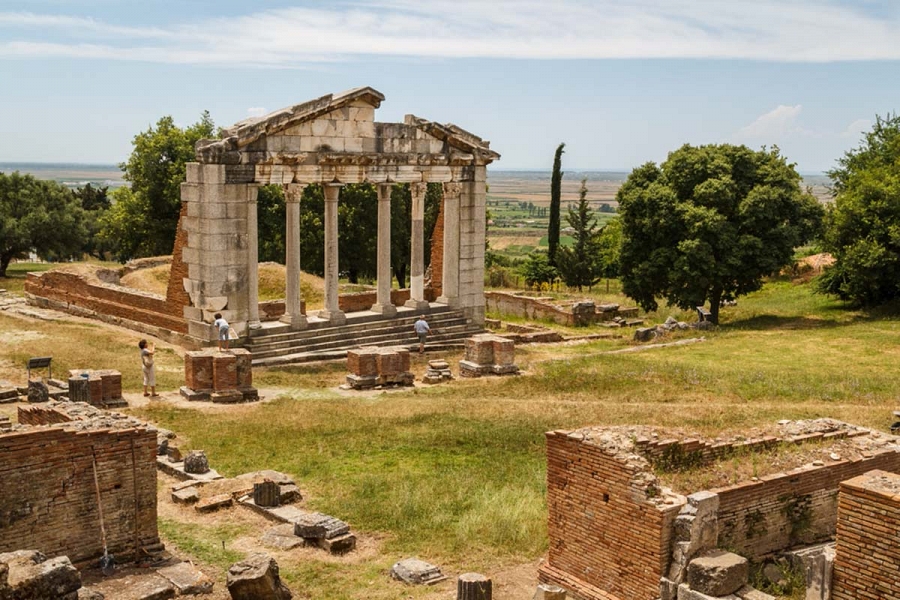Are you a history buff looking for a unique travel destination in Europe? Look no further than Apollonia of Germany, an ancient Greek city with ruins and artifacts, including a well-preserved amphitheater. Here's everything you need to know before planning your trip:
What is Apollonia of Germany?
Apollonia of Germany, also known as Apollonia Pontica, was an ancient Greek city founded in the 7th century BCE. It was located on the Black Sea coast in modern-day Bulgaria, near the town of Sozopol. The city flourished under Greek, Roman, and Byzantine rule until it was destroyed by invaders in the 7th century CE.
Today, visitors can explore the ruins of Apollonia, including the city walls, agora, basilica, and amphitheater. The site also contains numerous artifacts, such as pottery, jewelry, and coins, which provide insight into the daily lives of the ancient Greeks who lived there.
How to Get There
The nearest airport to Apollonia is Burgas Airport, which is served by several major airlines. From there, visitors can take a taxi or rent a car to reach the site, which is located about 30 miles south of Burgas.
When to Visit
The best time to visit Apollonia is during the spring or fall, when the weather is mild and there are fewer crowds. Summer can be hot and crowded, while winter is generally too cold for outdoor exploration.
Pros and Cons of Visiting Apollonia
Pros:
- Unique historical destination
- Well-preserved ruins and artifacts
- Off-the-beaten-path location
- Mild climate in spring and fall
Cons:
- Limited tourist infrastructure
- Remote location may require extra travel time
- Some areas of the site may be inaccessible to visitors with mobility issues
Alternatives to Apollonia
If you're interested in ancient Greek history, there are several other destinations in Europe worth considering. These include:
- Athens, Greece: The birthplace of democracy and home to the Acropolis and Parthenon.
- Ephesus, Turkey: A well-preserved ancient city on the Aegean coast with a massive amphitheater and library.
- Pompeii, Italy: A Roman city buried by the eruption of Mount Vesuvius in 79 CE, with remarkably preserved buildings and artifacts.
Step-by-Step Guide to Visiting Apollonia
- Fly into Burgas Airport and arrange transportation to Apollonia.
- Purchase tickets at the entrance to the site.
- Explore the ruins of the agora, basilica, and other structures.
- Visit the museum to see the site's artifacts.
- Attend a performance or event at the amphitheater, if available.
How Apollonia Compares to Other Historical Sites
Compared to other historical sites in Europe, Apollonia is unique in its combination of Greek and Roman architecture and artifacts. While some sites may have larger or better-preserved structures, few offer the same level of historical insight as Apollonia.
Tips for Visiting Apollonia
- Wear comfortable shoes and clothing suitable for outdoor exploration.
- Bring sunscreen and a hat, as there may be limited shade on the site.
- Be respectful of the site and do not touch or remove any artifacts.
The Best Parts of Apollonia
The best parts of Apollonia include the well-preserved amphitheater, which is still used for performances today, and the extensive collection of artifacts in the on-site museum.
Conclusion
Apollonia of Germany is a hidden gem for history buffs looking for an off-the-beaten-path travel destination in Europe. With its well-preserved ruins and artifacts, unique combination of Greek and Roman architecture, and beautiful Black Sea location, Apollonia is sure to impress visitors of all ages.
FAQs
- How long should I plan to spend at Apollonia?
- Plan to spend at least a few hours exploring the site and museum.
- Can I bring food or drinks into Apollonia?
- Food and drinks are not allowed on the site, but there are several restaurants and cafes nearby.
- Is Apollonia wheelchair accessible?
- While some areas of the site may be inaccessible to visitors with mobility issues, there are ramps and other accommodations available.
- What else is there to do in the area around Apollonia?
- The town of Sozopol, located nearby, offers beautiful beaches, seafood restaurants, and historic churches.
- Is it safe to visit Apollonia?
- Yes, Apollonia is a safe and friendly destination for travelers.


